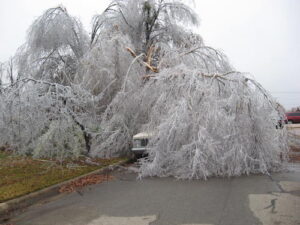— it separates leaders from managers
This is definitely not one of those academic treatises about the difference between leadership and management. I outright despise those.
Nor is it a “thought piece” similar to those written in the last year about leading and managing in and through a crisis. Lord knows we’ve had plenty of them crowding our inboxes.

Here in Texas we pride ourselves on getting through one crises – economic, natural, and political disasters are all second nature to us now. Believe me when I say we can lead and manage the hell out of a crisis.
And then hell Texas froze over.
Now 2020 definitely sucked, and 2021 was off to a shaky start, but just when we thought we were hitting our stride with COVID – balancing work between home and office, keeping stores and restaurants open without endangering anyone’s health, and keeping industry producing and the economy running – Texas came to a screeching halt.

So, what do we do when crisis turns to chaos?
The first thing we want to do well is manage the hell out of it. Calm heads with excellent managerial skills find ways to keep producing, delivering, selling, operating, etc., the best we can. Lessons learned when we tame chaos and crisis back to normal day-to-day operations can quickly become marketplace advantages. If we don’t do it well, we’re probably just like everyone else.
How’s that different that what we did most of 2020? Not much, except that for much of 2020 we weren’t that concerned about our workforce freezing to death or being physically unable to leave their homes. Not to mention how little concern we had for their home repair projects.
I’m not down on managers. Often underappreciated and over maligned, managers get a lot of flak for not being good leaders. But it’s our own fault when our great doers aren’t great managers and great managers aren’t great leaders if we haven’t given them the tools to be effective. Here’s an example:
A local hospital department manager I know (a good doer) responded to the chaos around him by contacting each of his employees in the hospital and the surrounding clinics under his control when they could report to work (and left their supervisors out of the loop). But he didn’t ask a single one how they were doing. When one of the employees reported she had fallen on the ice and broken her arm, he only asked for how long she might miss work.

No, because none of those are real.
In crisis-turned-chaos, a leader’s concern has to be first and foremost about people. Does it suck to have to lead and manage simultaneously? Sometimes. Suck it up, buttercup. That’s what they pay us the big bucks for. And we can’t manage or lead without dealing with people, so when we’re trying to do both at the same time in the midst of chaos, here are four key skills to rely on:
- Make sure your people are safe. The military has a few institutionalized methods of reaching every single servicemember under an individual’s charge. It starts at the top and branches out so that at each level of supervision, everyone is accounted for and provided critical information. If our organizations don’t have a way to pass accountable information from the top to the bottom other than sending ignorable emails, we’re doing it wrong. In chaos like this, a leader’s number one concern should be: are all my people safe. The next should be:
- Ask if they need help that you can provide. We may not be in a position to provide anything but moral support. On the other hand, we might have a list of resources they can reach out to. Totally dependent on us and/or our organization, but the least we can do is listen to their needs. Leaders listen and then:
- Admit vulnerability. I couldn’t get out of my neighborhood for a week, so I couldn’t rescue my daughter who was without power and water, and she couldn’t get to us. Hell yeah, I felt It’s okay to admit stuff’s happening that we can’t control and don’t know when it’s going to end, but leaders do it in a way that doesn’t portray helplessness or hopelessness. Leaders acknowledge the difficulty while portraying the confidence that we’re going to make it through it stronger. I know it sounds cheesy, but people are looking for a confident anchor in their leader, not an uninflated life preserver. Finally:
- Execute 360-degree leadership. Once we’ve accounted for all our people and done what we could to assure them they’re not alone, reach out to peers to see how they’re doing and then call our boss. Like a preemptive strike to keep from being inundated by incoming calls yourself. Is it elf-serving to call your boss to check in? Maybe if that’s the motive, but in this case, it’s just good leadership.
Managers are about the organization; leaders are about the organization’s people. We don’t often sit around ruminating about responding to chaos, but it probably wouldn’t hurt once in a while. Because our response will reveal whether We Care About People on the wall is a core value or only a trite slogan.

One thing is for sure, there are a lot of Texans who look back fondly on the days when we only had a global pandemic to deal with.

